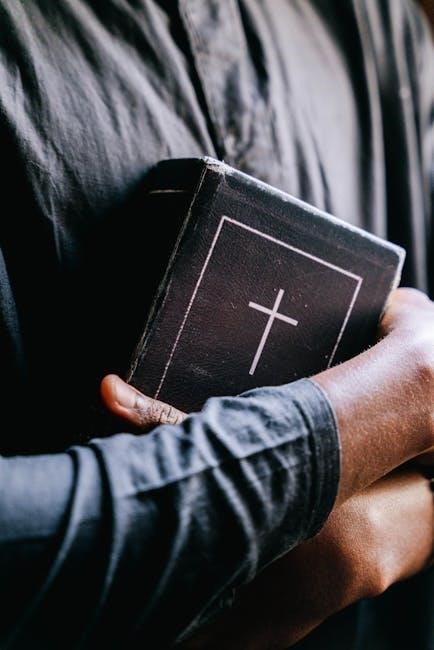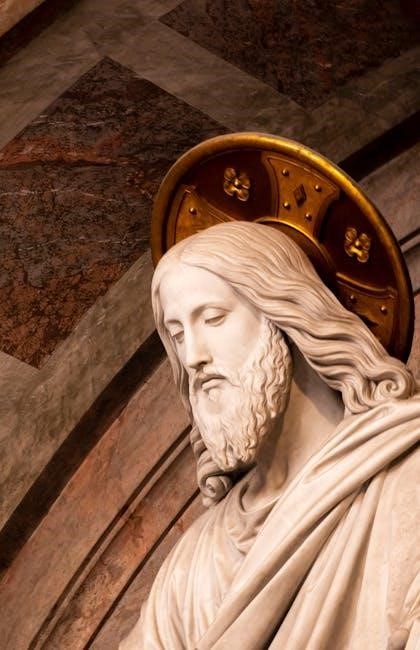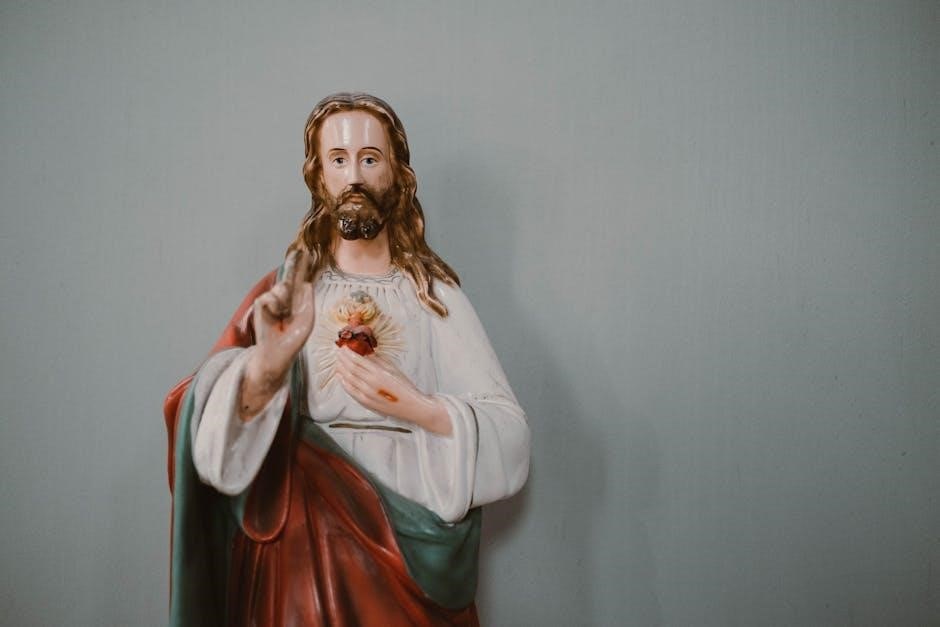The Divine Mercy Novena, rooted in Catholic devotion, is a nine-day prayer cycle beginning on Good Friday. It emphasizes God’s mercy and compassion, inspired by Saint Faustina Kowalska’s revelations. The novena includes specific intentions for each day, accompanied by prayers and reflections, culminating in Divine Mercy Sunday. This devotion fosters spiritual renewal and trust in God’s infinite mercy.
1.1. What is the Divine Mercy Novena?
The Divine Mercy Novena is a nine-day prayer devotion that begins on Good Friday and concludes on Divine Mercy Sunday. It involves reciting the Chaplet of Divine Mercy, offering specific intentions each day, and reflecting on God’s mercy. This novena, revealed to Saint Faustina Kowalska, emphasizes trusting in God’s infinite mercy and seeking His grace for various groups of souls, fostering spiritual renewal and purification.
1.2. Significance of the Divine Mercy Novena in Catholic Devotion
The Divine Mercy Novena holds profound significance in Catholic devotion as a powerful prayer practice fostering trust in God’s mercy. Originating from Saint Faustina’s visions, it underscores the Church’s emphasis on divine compassion and forgiveness. This novena, prayed globally, unites believers in seeking mercy for all souls and reflects the core message of Catholicism: God’s boundless love and redemption, celebrated especially on Divine Mercy Sunday.
Background and Origins
The Divine Mercy Novena originates from the revelations of Saint Faustina Kowalska, a Polish nun, who received divine instructions to pray for mercy for all souls. The novena begins on Good Friday, as Jesus requested, and is deeply rooted in Catholic spirituality, emphasizing God’s infinite compassion and forgiveness.
2.1. The Role of Saint Faustina Kowalska
Saint Faustina Kowalska, a Polish nun, received revelations from Jesus, emphasizing His Divine Mercy. She recorded these in her diary, becoming the Apostle of Divine Mercy. Jesus instructed her to pray the novena for specific groups, starting on Good Friday. Her diary is the primary source for the novena prayers, reflecting God’s compassion. Faustina’s mission was to spread mercy, and her canonization by Pope John Paul II solidified her role in Catholic devotion.
2.2. The Diary of Saint Faustina and Its Relevance
Saint Faustina’s diary, titled Divine Mercy in My Soul, is a foundational text for the Divine Mercy devotion. It contains Jesus’ direct revelations to Faustina, outlining the novena’s structure and intentions. The diary emphasizes mercy, trust, and prayer, offering spiritual guidance. Its relevance lies in its universal message of divine compassion, making it a key resource for understanding and practicing the novena, as well as deepening one’s faith and relationship with God.
Structure of the Divine Mercy Novena
The Divine Mercy Novena is a nine-day prayer cycle beginning on Good Friday, with specific intentions for each day, culminating in Divine Mercy Sunday. It includes the Chaplet of Divine Mercy and reflections, fostering a deeper connection to God’s mercy and compassion throughout the Easter season.
3.1. The Nine-Day Prayer Cycle
The Divine Mercy Novena is a nine-day prayer cycle, beginning on Good Friday and concluding on Divine Mercy Sunday. Each day focuses on specific intentions, such as praying for all humanity, priests, the faithful departed, and lukewarm souls. The cycle includes the Chaplet of Divine Mercy, opening prayers, and reflections, emphasizing God’s mercy and compassion. This structured approach helps deepen devotion and trust in His infinite love and forgiveness throughout the Easter season.
3.2. Starting the Novena on Good Friday
The Divine Mercy Novena begins on Good Friday, as Jesus requested through Saint Faustina. This day symbolizes Christ’s ultimate act of mercy through His sacrifice. Starting the novena on Good Friday aligns it with the Easter season, culminating in Divine Mercy Sunday. The nine-day prayer cycle reflects on God’s mercy, offering a powerful way to prepare for the feast and deepen devotion to His infinite love and forgiveness.

Day 1 of the Novena
Day 1 of the Divine Mercy Novena begins on Good Friday, focusing on prayers for all humanity. It emphasizes trusting in God’s boundless mercy and compassion for every soul.
4.1. Intentions for Day 1: All Humanity
The first day of the Divine Mercy Novena focuses on praying for all humanity. This intention, revealed through Saint Faustina, encourages intercession for every soul, seeking God’s mercy and salvation for the entire world. It emphasizes universal compassion and the desire for all people to experience divine grace and forgiveness.
4.2. Prayers and Reflections for Day 1
The prayers for Day 1 include the Chaplet of Divine Mercy, focusing on all humanity. Begin with the optional opening prayers, followed by the Chaplet, which includes the Our Father, Hail Mary, and Apostle’s Creed. Reflect on Saint Faustina’s words: “Let the mercy of the Lord descend upon us.” Pray for the salvation of all souls, trusting in God’s infinite mercy and compassion for the world.

Day 2 of the Novena
Day 2 focuses on priests and religious, praying for their holiness and perseverance. The Chaplet is recited, seeking divine mercy for their dedication and spiritual strength.
5.1. Intentions for Day 2: Priests and Religious
The second day of the Divine Mercy Novena is dedicated to praying for priests and religious. The intention focuses on seeking divine mercy for their holiness, perseverance, and unwavering commitment to their vocations. Through specific prayers and reflections, the faithful ask for spiritual strength and guidance for those dedicated to serving the Church and spreading God’s mercy.
5.2. Prayers and Reflections for Day 2
On the second day, prayers focus on priests and religious, seeking divine mercy for their holiness and perseverance. The Chaplet of Divine Mercy is recited, emphasizing their role in spreading God’s mercy. Reflections highlight their dedication to their vocations, asking for spiritual strength and guidance. Specific prayers include the Our Father, Hail Mary, and Apostles’ Creed, followed by the Chaplet’s repetitions, imploring mercy for their souls and their mission.
Day 3 of the Novena
Day 3 focuses on prayers for the faithful departed, seeking divine mercy for their souls. The Chaplet is recited, offering comfort and hope for their eternal rest.
6.1. Intentions for Day 3: The Faithful Departed
On Day 3, prayers focus on the faithful departed, seeking divine mercy for their souls. This day emphasizes interceding for those who have passed, trusting in God’s compassion to bring them eternal peace. It reflects Saint Faustina’s teachings on the importance of praying for the deceased, offering solace to the grieving and hope for the souls’ purification. The intention aligns with the novena’s core message of mercy and redemption.
6.2. Prayers and Reflections for Day 3
On Day 3, the focus is on praying for the faithful departed, seeking divine mercy for their souls. The Chaplet of Divine Mercy is recited, emphasizing trust in God’s compassion. Reflections highlight the importance of interceding for the deceased, offering comfort to the grieving. Prayers include the Eternal Rest prayer and petitions for the souls’ purification. This day underscores the novena’s theme of mercy and hope for eternal peace.

Day 4 of the Novena
Day 4 focuses on praying for those who do not believe in God. The Chaplet is recited, emphasizing trust in divine mercy and compassion for unbelievers.
7.1. Intentions for Day 4: Those Who Do Not Believe in God
Day 4 of the Divine Mercy Novena focuses on praying for those who do not believe in God, including atheists and agnostics. The intention is to intercede for their spiritual enlightenment, seeking God’s mercy to touch their hearts and lead them to faith. This day emphasizes the importance of prayer for the conversion of souls and the gift of belief.
7.2. Prayers and Reflections for Day 4
On Day 4, pray the Chaplet of Divine Mercy for those who do not believe in God. Begin with the optional opening prayer: “You expired, Jesus, but the source of life gushed forth for souls.” Reflect on the mercy of God and His desire to save all people. Conclude with the closing prayer: “Eternal God, in whom mercy is endless and the treasury of compassion inexhaustible, look kindly upon us.”

Day 5 of the Novena
Day 5 focuses on those who do not trust in God’s mercy. Prayers include the Chaplet of Divine Mercy, emphasizing trust and surrender to God’s loving plan.
8.1. Intentions for Day 5: Those Who Do Not Trust in God’s Mercy
Day 5 of the Divine Mercy Novena focuses on praying for individuals who struggle to trust in God’s mercy. This includes those who doubt His love or feel abandoned. The intention is to intercede for their spiritual healing, asking God to enlighten their hearts and strengthen their faith. This day emphasizes the importance of trust as a foundation for experiencing God’s mercy.
8.2. Prayers and Reflections for Day 5
On Day 5, pray for those who lack trust in God’s mercy using the Chaplet. Begin with the Our Father, Hail Mary, and Apostles’ Creed. Recite the Divine Mercy Chaplet, focusing on the prayer, “Eternal Father, I offer You the Body and Blood, Soul and Divinity of Your dearly beloved Son.” Reflect on Jesus’ words: “Souls without trust disappoint Me.” Ask for grace to strengthen their trust in His boundless love.
Day 6 of the Novena
Day 6 focuses on meek and humble souls, entreating God’s mercy for those who trust in His divine love and compassion, fostering their spiritual growth and peace.
9.1. Intentions for Day 6: Meek and Humble Souls
On Day 6, the novena focuses on meek and humble souls, imploring God’s mercy for those who trust in His divine love; This day emphasizes praying for the spiritual growth and inner peace of such souls, ensuring they remain steadfast in their humility and faith. The intention aligns with Saint Faustina’s revelations, highlighting the importance of compassion and trust in God’s infinite mercy.
9.2. Prayers and Reflections for Day 6
On Day 6, prayers focus on meek and humble souls, seeking God’s mercy for their spiritual growth. The Chaplet of Divine Mercy is recited, emphasizing humility and trust in God’s love. Reflections highlight the importance of surrendering to His will and embracing simplicity. Prayers from Saint Faustina’s Diary, such as “O Lord, I want to be completely transformed into Your mercy,” guide followers to deepen their faith and compassion for others.

Day 7 of the Novena
Day 7 focuses on souls detained in purgatory, praying for their purification and entrance into heaven. The Chaplet is recited, with closing prayers seeking God’s mercy for these souls.
10.1. Intentions for Day 7: Souls Detained in Purgatory
On Day 7, the Divine Mercy Novena focuses on praying for souls detained in purgatory. The intention is to seek purification for these souls, ensuring their swift entry into eternal life. Through the Chaplet and specific prayers, believers ask for God’s mercy to relieve their suffering. The prayers emphasize trust in God’s infinite compassion and the hope of eternal union with Him.
10;2. Prayers and Reflections for Day 7
On Day 7, prayers focus on souls in purgatory, seeking their purification and swift entry into eternal life. The Chaplet is recited, emphasizing trust in God’s mercy. Reflections highlight the importance of interceding for these souls, offering comfort and hope. Specific prayers include asking for relief from their suffering and accelerated union with God, reinforcing the novena’s theme of divine compassion and redemption.
Day 8 of the Novena
Day 8 focuses on those in their final agony, praying for their peaceful transition and trust in God’s mercy. The Chaplet and specific intentions are central to this day’s devotion.
11.1. Intentions for Day 8: Those Who Are in the Final Agony
On Day 8 of the Divine Mercy Novena, prayers focus on those nearing death, seeking a peaceful and holy passage. The intention is to implore God’s mercy for their souls, ensuring they embrace His love in their final moments. This day emphasizes compassion and intercession for the dying, asking for their last moments to be filled with grace and repentance.
The Chaplet of Divine Mercy is prayed specifically for their spiritual comfort, alongside other devotions like the Rosary or Apostles’ Creed, fostering trust in God’s infinite mercy and eternal peace for their souls.
11.2. Prayers and Reflections for Day 8
On Day 8, prayers focus on those in their final agony, seeking divine mercy for their souls. Begin with the Chaplet of Divine Mercy, reciting the optional opening prayer: “You expired, Jesus, but the source of life gushed forth for souls.” Reflect on God’s compassion and pray for the dying to embrace His love. Conclude with the closing prayer, asking for eternal rest and mercy for their souls. This day deepens trust in God’s infinite mercy and grace.
Day 9 of the Novena
The ninth day focuses on lukewarm souls, praying for their rekindled faith and love for God. The Chaplet of Divine Mercy is recited, seeking divine intervention.
12.1. Intentions for Day 9: Lukewarm Souls
Day 9 of the Divine Mercy Novena focuses on lukewarm souls, praying for their rekindled faith and renewed love for God. This day, as revealed to Saint Faustina, is dedicated to those who are indifferent or apathetic in their spiritual lives. Through the Chaplet of Divine Mercy, believers intercede for these souls, seeking divine intervention to transform their hearts and reawaken their devotion to God.
12.2. Prayers and Reflections for Day 9
On Day 9, the Chaplet of Divine Mercy is prayed for lukewarm souls, seeking their spiritual renewal. The prayer asks Jesus to enkindle their hearts with love and faith. Reflections focus on the dangers of spiritual complacency and the need for humility. The Closing Prayer implores God’s mercy to transform these souls, emphasizing trust in His divine plan and the power of intercession through the Chaplet.
The Chaplet of the Divine Mercy
The Chaplet of the Divine Mercy, part of the Novena, begins on Good Friday and ends on Divine Mercy Sunday. It includes the Our Father, Hail Mary, and Apostle’s Creed, followed by the Divine Mercy ejaculations, concluding with an optional closing prayer for God’s mercy.
13.1. Opening Prayers of the Chaplet
The Chaplet begins with optional opening prayers, including the Sign of the Cross and invocations like “You expired, Jesus, but the source of life gushed forth for souls,” emphasizing God’s mercy. These prayers, derived from Saint Faustina’s Diary, set a tone of reverence and petition, inviting divine grace and preparing the heart for the ensuing devotion. They reflect trust in God’s boundless compassion.
13.2. The Chaplet Itself
The Chaplet of the Divine Mercy consists of prayers recited using rosary beads. It begins with the Our Father, Hail Mary, and Apostles’ Creed, followed by the Divine Mercy prayer repeated on each bead. The prayer “For the sake of His sorrowful Passion, have mercy on us and on the whole world” is central, emphasizing trust in God’s mercy and compassion for all souls. This devotion is a powerful expression of faith and intercession.
13.3. Closing Prayers of the Chaplet
The Chaplet concludes with closing prayers, including “Eternal God, in whom mercy is endless,” seeking divine mercy for the entire world. These prayers, optional but deeply meaningful, emphasize trust in God’s compassion; The final prayer appeals for the salvation of souls, invoking divine mercy and its transformative power. These closing prayers reflect the novena’s core theme of trusting in God’s infinite mercy and grace.
The Divine Mercy Novena profoundly impacts faith, fostering trust in God’s mercy and compassion. Its prayers and reflections inspire spiritual renewal, encouraging continued devotion and trust in divine grace.
14.1. The Impact of the Divine Mercy Novena on Faith
The Divine Mercy Novena has a profound impact on faith, deepening trust in God’s mercy and fostering spiritual renewal. It encourages believers to reflect on divine compassion, inspiring empathy and a deeper connection to God’s love. Through its structured prayers and intentions, the novena unites faithful worldwide, strengthening their commitment to living mercifully and trusting in God’s grace. This devotion transforms hearts, nurturing enduring faith and hope.
14.2. Continuing the Devotion Beyond the Novena
After completing the Divine Mercy Novena, faithful are encouraged to integrate its teachings into daily life. This includes reciting the Chaplet of Divine Mercy regularly and reflecting on Saint Faustina’s diary for spiritual growth. By embracing mercy, compassion, and trust in God, believers can live out the novena’s principles year-round, fostering a deeper connection to divine grace and sharing Christ’s mercy with others in their communities and beyond.
